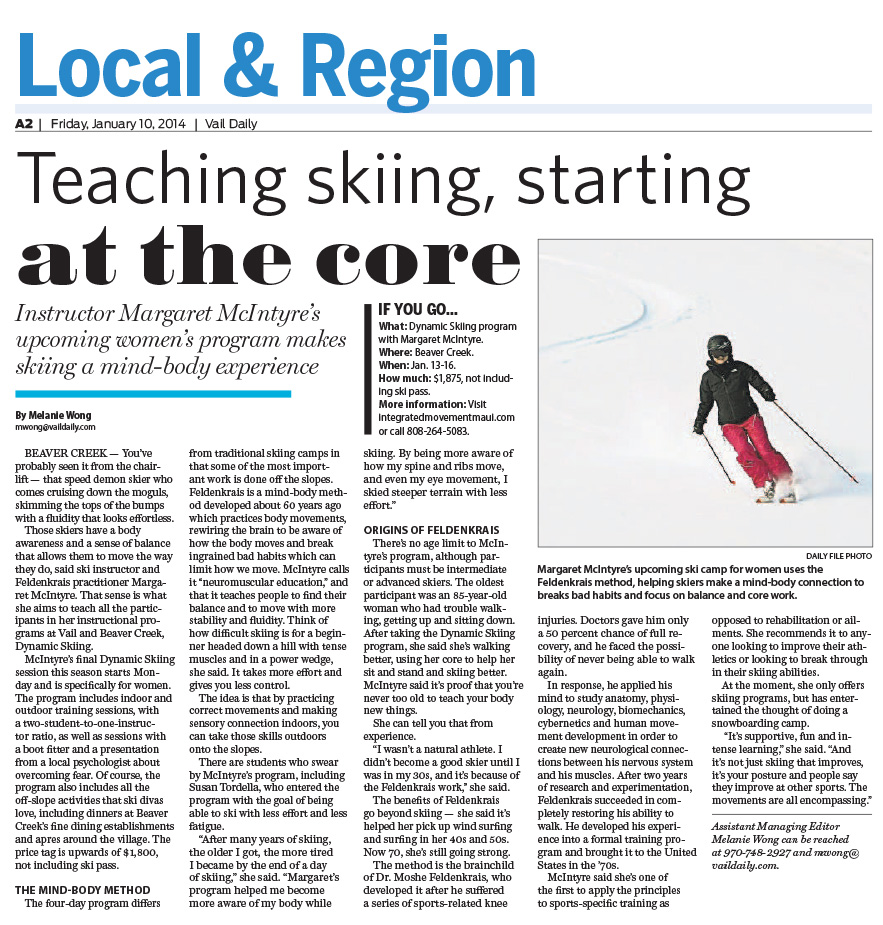Teaching skiing, starting at the core
by Melanie Wong, Vail Daily 1/9/2014

BEAVER CREEK — You’ve probably seen it from the chairlift — that speed demon skier who comes cruising down the moguls, skimming the tops of the bumps with a fluidity that looks effortless.
Those skiers have a body awareness and a sense of balance that allows them to move the way they do, said ski instructor and Feldenkrais practitioner Margaret McIntyre. That sense is what she aims to teach all the participants in her instructional programs at Vail and Beaver Creek, Dynamic Skiing.
McIntyre’s final Dynamic Skiing session this season starts Monday and is specifically for women. The program includes indoor and outdoor training sessions, with a two-student-to-one-instructor ratio, as well as sessions with a boot fitter and a presentation from a local psychologist about overcoming fear. Of course, the program also includes all the off-slope activities that ski divas love, including dinners at Beaver Creek’s fine dining establishments and apres around the village. The price tag is upwards of $1,800, not including ski pass.
The mind-body method
The four-day program differs from traditional skiing camps in that some of the most important work is done off the slopes. Feldenkrais is a mind-body method developed about 60 years ago which practices body movements, rewiring the brain to be aware of how the body moves and break ingrained bad habits which can limit how we move. McIntyre calls it “neuromuscular education,” and that it teaches people to find their balance and to move with more stability and fluidity. Think of how difficult skiing is for a beginner headed down a hill with tense muscles and in a power wedge, she said. It takes more effort and gives you less control.
The idea is that by practicing correct movements and making sensory connection indoors, you can take those skills outdoors onto the slopes.
There are students who swear by McIntyre’s program, including Susan Tordella, who entered the program with the goal of being able to ski with less effort and less fatigue.
“After many years of skiing, the older I got, the more tired I became by the end of a day of skiing,” she said. “Margaret’s program helped me become more aware of my body while skiing. By being more aware of how my spine and ribs move, and even my eye movement, I skied steeper terrain with less effort.”
Origins of Feldenkrais
There’s no age limit to McIntyre’s program, although participants must be intermediate or advanced skiers. The oldest participant was an 85-year-old woman who had trouble walking, getting up and sitting down. After taking the Dynamic Skiing program, she said she’s walking better, using her core to help her sit and stand and skiing better. McIntyre said it’s proof that you’re never too old to teach your body new things.
She can tell you that from experience.
“I wasn’t a natural athlete. I didn’t become a good skier until I was in my 30s, and it’s because of the Feldenkrais work,” she said.
The benefits of Feldenkrais go beyond skiing — she said it’s helped her pick up wind surfing and surfing in her 40s and 50s. Now 70, she’s still going strong.
The method is the brainchild of Dr. Moshe Feldenkrais, who developed it after he suffered a series of sports-related knee injuries. Doctors gave him only a 50 percent chance of full recovery, and he faced the possibility of never being able to walk again.
In response, he applied his mind to study anatomy, physiology, neurology, biomechanics, cybernetics and human movement development in order to create new neurological connections between his nervous system and his muscles. After two years of research and experimentation, Feldenkrais succeeded in completely restoring his ability to walk. He developed his experience into a formal training program and brought it to the United States in the ’70s.
McIntyre said she’s one of the first to apply the principles to sports-specific training as opposed to rehabilitation or ailments. She recommends it to anyone looking to improve their athletics or looking to break through in their skiing abilities.
At the moment, she only offers skiing programs, but has entertained the thought of doing a snowboarding camp.
“It’s supportive, fun and intense learning,” she said. “And it’s not just skiing that improves, it’s your posture and people say they improve at other sports. The movements are all encompassing.”
Assistant Managing Editor Melanie Wong can be reached at 970-748-2927 and mwong@vaildaily.com.
